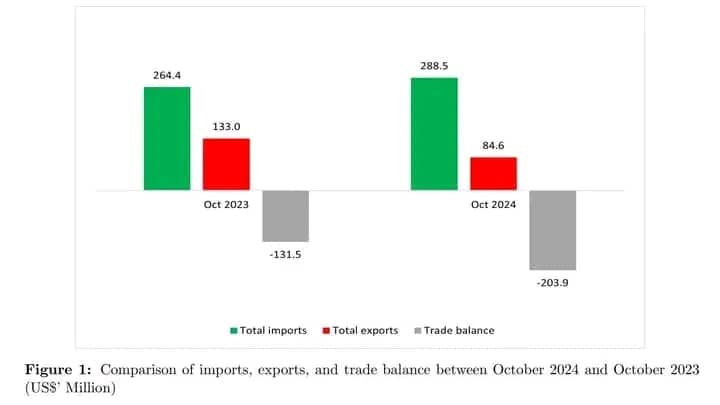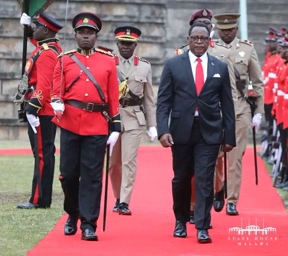Malawi’s Trade Deficit Widens as Imports Increase and Exports Shrink

By Smile Hamilton, Malawi
Malawi’s growing appetite for imported goods has widened its trade deficit with other economies, increasing by 55.1 percent while exports shrink.
According to the International Merchandise Trade Statistics published on Monday by the National Statistical Office (NSO), in October 2024, total imports increased to US$288.5 million from US$264.4 million in October 2023, representing a 9.1 percent increase.
The report disclosed that total exports declined, reaching US$84.6 million in October 2024 from US$133 million in October 2023, representing a 36.4 percent decline.
The NSO says this shows that the trade balance has expanded to a deficit of US$203.9 million in October 2024, compared to a deficit of US$131.5 million in October 2023.
The widening trade deficit is a cause for concern, as it may lead to a depletion of the country’s foreign exchange reserves. This, in turn, may exacerbate the current fuel shortages, which are largely due to the scarcity of foreign exchange.
The government needs to take urgent action to address the trade deficit and ensure that the country’s foreign exchange reserves are sufficient to meet its import needs.
One way to address the trade deficit is to promote exports and reduce reliance on imports. The government can do this by providing support to local businesses and farmers, and by implementing policies that encourage exports.
Additionally, the government can also explore new markets for Malawian products, such as the African Continental Free Trade Area (AfCFTA).
The private sector also has a role to play in addressing the trade deficit. Businesses can invest in productive sectors such as agriculture and manufacturing, which can help to increase exports and reduce reliance on imports.
Additionally, businesses can also explore new markets and opportunities for exports.
In conclusion, the widening trade deficit is a concern that needs to be addressed urgently. The government and the private sector need to work together to promote exports, reduce reliance on imports, and ensure that the country’s foreign exchange reserves are sufficient to meet its import needs.
categories
recent posts

MALAWI: Mzimba Chief Dismisses Traditional Leaders Over Anti-MCP Primary Statement

MALAWI: President Chakwera Heads To SADC Summit In Zimbabwe


South Sudan Media Authority Launches Official Website

